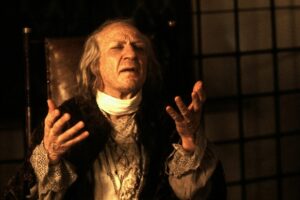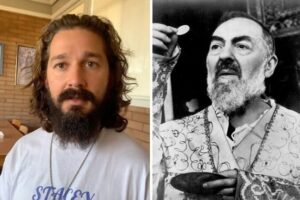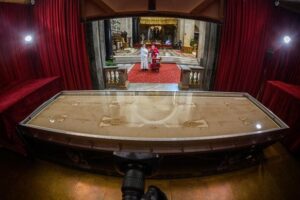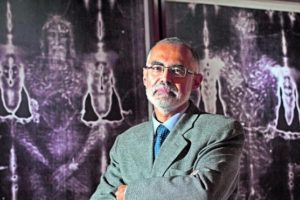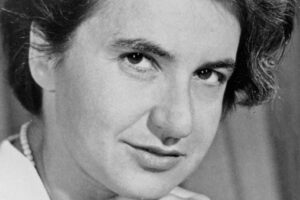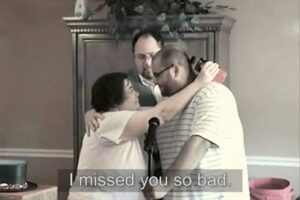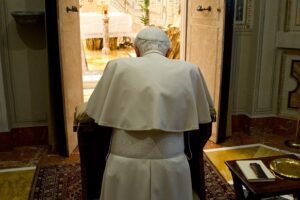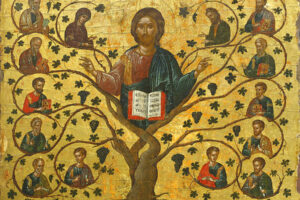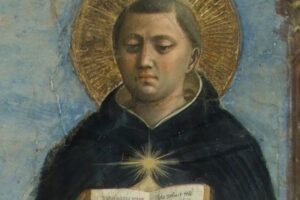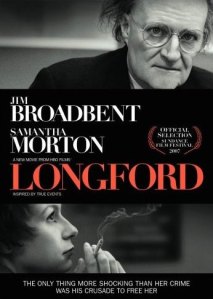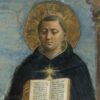Longford: an extraordinary film!
In 1965, he begins visiting Myra Hindley [Samantha Morton , a young woman serving a life sentence for murdering children with her lover Ian Brady [Andy Serkis . Though Longford encountered public outrage, discouragement from his wife Elizabeth [Lindsay Duncan , doubt from his family, and criticism from his colleagues and the press, he continued to visit and exchange letters with Hindley. After learning that she once converted to Catholicism, Longford encourages her to return to the church and ask for God’s forgiveness.
After the Prime Minister removes him from the House of Lords, he devotes his time to crusading for Hindley and other prisoners. His wife eventually joins the crusade after reading Hindley’s letters, meeting her and seeing the horrible prison conditions. She suspects that Hindley is receiving harsher punishment because she is a woman. Longford takes Hindley’s cause public, talking to the press about her case and defending her as an accomplice corrupted by Ian Brady.
At first, Hindley is grateful for Longford’s efforts and seems to make progress in her return to the church. Later, she unexpectedly rejects his help and shocks him with the news that she lied to him about the murders. Once this information is made public, Longford’s good name is damaged even further. Longford begins to question his religious beliefs, but reaches a deeper level in his Catholic faith when he is able to forgive Hindley for her transgressions against him.
Many years later, she asks him to visit her once again and he complies. He shares with her the importance of their friendship to him. Until the end of his life in 2001, Longford continues to visit prisoners, crusading for prison reform. Hindley dies in prison in 2002 after serving 36 years, even though the average life sentence is 12 years for men convicted of similar crimes. To this day, Ian Brady continues to serve his life sentence.
More about Francis Aungier Pakenham
Francis Aungier Pakenham, 7th Earl of Longford, KG, PC (5 December 1905–3 August 2001) was a politician, author, and social reformer. He was a noted Labour minister and is considered by some to be a human rights campaigner, however he attracted much controversy with his (ultimately unsuccessful) campaign for the release of Moors murderer Myra Hindley from prison, and also for his high-profile opposition to the gay rights movement. He was also criticised by the media for touring the sex clubs of Europe which he had attempted to close down. He was a peer four times over holding three baronies (Pakenham, Longford and Pakenham of Cowley) and one earldom (Longford).
The second son of Thomas Pakenham, 5th Earl of Longford, of the second creation, in the Peerage of Ireland, he was educated at Eton College and New College, Oxford, where, despite having failed to be awarded a scholarship, he graduated with a first-class honours degree in Philosophy, Politics, and Economics (also called Modern Greats). He became a don at Christ Church, Oxford. At Oxford he met his future wife, Elizabeth Harman, an undergraduate at Lady Margaret Hall, Oxford.
In 1931, 25-year-old Pakenham joined the Conservative Research Department where he developed Education policy for the Conservative Party. His future wife persuaded him to become a socialist.They married on November 3, 1931 and eventually had a total of eight children. In 1940, after a period of religious unease, he converted to Roman Catholicism. His wife was initially dismayed by this, as she had been brought up as a Unitarian and associated Catholicism with reactionary politics; however, she herself converted to Catholicism in 1946. Pakenham embarked on a political career.
In 1945, he was created Baron Pakenham, of Cowley in the City of Oxford, in the Peerage of the United Kingdom, and took his seat in the House of Lords. He served as a junior minister in the Labour governments of 1945–1951 and as a Cabinet member from 1964 to 1968. Known for his interest in Irish history he wrote a number of books on the topic. Peace By Ordeal: An Account from First-Hand Sources of the Negotiation and Signature of the Anglo-Irish Treaty of 1921, published in 1935, is arguably his best known work which documents the negotiations of the Anglo-Irish Treaty of 1921 between the Irish and British representatives. His account uses primary sources from the time and is widely recognised as the definitive account of this aspect of Irish history.
Longford also came to greatly admire Eamon de Valera and was chosen as the co-author of his official biography Eamon de Valera which was published in 1970 and which was co-written by Thomas P. O’Neill. He also campaigned for decades to have the Hugh Lane bequest pictures restored to Dublin, resulting in a compromise agreement in 1959. In 1961, he inherited from his brother the Earldom of Longford in the Peerage of Ireland and from then onwards was generally known to the public as Lord Longford. He was created a Knight of the Garter in 1971.
Over time he gained a reputation for eccentricity, becoming known for his efforts to rehabilitate offenders and in particular campaigning for the parole and release from prison of the Moors murderer Myra Hindley, which led to the soubriquet Lord Wrongford from the tabloid press, who also nicknamed him «Lord Porn» after he toured Europe’s sex clubs that he had attempted to close down. Longford was a founding member of New Bridge, an organisation founded in 1956, which aims to help prisoners stay in touch with society and integrate back into it. He was a leading figure in the Nationwide Festival of Light of 1971, protesting against the commercial exploitation of sex and violence in Britain, and advocating the teaching of Christ as the key to recovering moral stability in the nation.
His anti-pornography campaigning made him the subject of derision as Lord Porn when he and former prison doctor Christine Temple-Saville set out on a wide-ranging tour of sex industry establishments in the early 1970s to compile a self-funded report. The press made much of his visits to strip clubs in Copenhagen at the time. It also coincided with Longford’s contact with Hindley becoming public knowledge in 1972, and allegations of hypocrisy were frequently made against him. In 1977, Longford appeared on television and spoke openly of his belief that Hindley should now be released from prison as she had repented for her sins and was no longer a danger to the public. In 1985, h
e condemned the Parole Board’s decision not to consider Hindley’s release for another five years as «barbaric», and his campaign for Hindley continued even after she admitted to two more murders in 1986. I
n 1990, Home Secretary David Waddington ruled that life should mean life for Hindley, as did the next three home secretaries. Hindley did make three appeals against her tariff between 1997 and 2000, but the High Court rejected each one. Longford spoke of his disgust that she was being kept in prison even though she was a changed woman who was no longer a threat. He regularly commented, along with several other of Hindley’s supporters, that she was a «political prisoner» who was being kept in prison for votes, claiming that successive Conservative and Labour home secretaries feared that their party would fall out of favour with the voters if they sanctioned Hindley’s release.
Hindley died in November 2002, having never been paroled. He was a staunch opponent of the gay rights movement, and in the 1980s was a vocal supporter of the introduction of Section 28 by Margaret Thatcher’s government. In a 1998 Lords debate on the subject of the age of consent, Longford remarked that, «…if someone seduced my daughter it would be damaging and horrifying but not fatal. She would recover, marry and have lots of children… On the other hand, if some elderly, or not so elderly, schoolmaster seduced one of my sons and taught him to be a homosexual, he would ruin him for life. That is the fundamental distinction.» Under the House of Lords Act 1999 the majority of hereditary peers lost the privilege of a seat and right to vote in the House of Lords. Lord Longford, as the recipient of a hereditary peerage of first creation (from his creation as Baron Pakenham), was, along with many others in the same situation, made a life peer so that he could retain his seat in the Lords. He was thus created Baron Pakenham of Cowley, of Cowley in the County of Oxfordshire. Lord Longford died in August 2001 at the age of 95. He and his wife, who died in October 2002 at the age of 96, had eight children, among them the writers Antonia Fraser, Rachel Billington, and Thomas Pakenham. His wife Elizabeth was a noted writer herself, her most famous book being Victoria R.I. (1964), a biography of Queen Victoria, published in the US as Born to Succeed. She also wrote a two-volume biography of the Duke of Wellington, and a volume of memoirs, The Pebbled Shore. She stood for Parliament as Labour candidate for Cheltenham in the 1950 general election.

